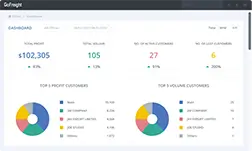The journey of transportation management has been one of relentless innovation and strategic evolution. From the days of manually coordinated freight movements to the modern era where transportation management systems (TMS) stand central to logistic strategies, the transformation is nothing short of revolutionary. With a rich history that shadows the progression of trade and commerce, today’s TMS solutions represent a leap into efficiency and optimization that businesses of the past could hardly imagine.
In our fast-paced global economy, where supply chains are as complex as they are critical, the necessity for a robust transportation management system becomes undeniable. Modern businesses face a landscape peppered with challenges ranging from transportation complexity to the need for timely delivery and higher customer satisfaction. This intricate web of demands positions TMS not just as a tool but as a cornerstone of modern supply chain management.
Why do businesses need a system like this? The answer lies in the multifaceted role that such systems play in managing the transportation process, providing visibility, and orchestrating the physical movement of goods across vast supply chains. Beyond mere fleet management, a robust TMS extends its capabilities to order management, freight billing, and shipment tracking—all on a single platform. It encapsulates the power of machine learning to deliver not just accurate predictions for shipping operations but also cost savings and administrative efficiency.
As we delve deeper into the mechanics and benefits of a transportation management system, we invite you to join us on a journey that explores how the strategic implementation of TMS technology can redefine your business operations, optimize routes, enhance carrier performance, and ultimately, chart a course for success in a complex logistical world.
The Core Components of a Transportation Management System
When peeling back the layers of a transportation management system (TMS), it’s essential to understand the architectural framework that supports its complex functionalities. A TMS isn’t a monolithic entity but a symphony of components working in concert to enhance the transportation management processes.
Understanding the Architecture of TMS
The architecture of a TMS is designed to be both robust and flexible, catering to the various nuances of supply chain operations. It encompasses everything from order management systems that initiate the shipping process to dynamic route optimization algorithms. The backbone of any TMS is its ability to provide real-time data and transportation planning tools, ensuring transportation data is both accessible and actionable.
Key Features of a Robust Transportation Management System
- A comprehensive TMS includes an array of features that touch upon every aspect of transportation management:
- Carrier Management: Seamlessly manage relationships with multiple carriers, comparing rates and services to select the best options.
- Load Planning and Optimization: Utilize machine learning to ensure efficient loading, carrier capacity utilization, and optimized routes for cost savings.
- Freight Settlement: Streamline the freight billing and payment process, reducing errors and administrative costs.
- Visibility and Tracking: Track shipments in real time, providing transparency and fostering customer satisfaction.
- Reporting and Business Intelligence: Harness tms data to generate custom reports and actionable business insights.
- Integration Capabilities: Sync with ERP systems, warehouse management systems, and other software to create a seamless supply chain ecosystem.
The Integration of TMS in Logistics Operations
In the realm of logistics management, a TMS is no longer a luxury but a necessity. Its integration into logistics operations propels businesses forward, handling complex transportation needs across multiple business units with efficiency and finesse. It stands at the core of modern logistics, providing a centralized platform to manage transportation, fleet management, and freight management with unprecedented clarity.
The right TMS can revolutionize how logistics service providers manage their operations, underpinning transportation management systems with the technological prowess needed to navigate the complexities of today’s transportation and supply chain challenges.
Transportation Management Systems vs. Warehouse Management Systems
While both Transportation Management Systems (TMS) and Warehouse Management Systems (WMS) play pivotal roles in the supply chain, they serve distinct functions that, when integrated, can significantly enhance operational efficiency.
Defining the TMS and WMS Functions
A TMS focuses on the transportation management aspect of the supply chain, dealing with the movement of goods from origin to destination. This includes carrier management, load planning, freight billing, and providing visibility into the shipping process.
Conversely, a WMS is primarily concerned with the day-to-day operations within a warehouse. This involves inventory management, order fulfillment, and yard management. It ensures goods are stored efficiently and that the warehouse management processes are optimized.
How TMS Complements WMS
TMS and WMS complement each other in several ways:
- Inventory Visibility: TMS enhances WMS by providing data on in-transit items, allowing for more accurate inventory planning.
- Order Fulfillment: TMS can optimize shipping operations, reducing the time from order placement to delivery, which directly benefits WMS activities.
- Cost Reduction: Integrating TMS with WMS can lead to significant cost savings through optimized transportation planning and warehouse operations.
The Convergence of TMS and WMS in Supply Chain Efficiency
The convergence of TMS and WMS represents a holistic approach to supply chain management. When these systems communicate seamlessly, they provide a comprehensive view of the supply chain operations, leading to improved customer satisfaction through better order management and timely delivery.
This integrated approach enables businesses to manage logistics management and warehouse management under a single platform, streamlining processes, and reducing the potential for error, thus ensuring higher customer satisfaction and operational excellence.
Together, TMS and WMS form the technological backbone of a modern, responsive, and efficient supply chain, capable of adapting to the evolving demands of commerce and providing detailed information for making informed decisions.
The Role of Transportation Management in Modern Supply Chains
In today’s complex and fast-paced market, effective transportation management is not just a component of operational strategy—it is the bedrock of efficient supply chain execution. Let’s delve into its multifaceted role.
Decoding the Complexities of Modern Transportation Management
Modern transportation management goes beyond merely moving goods from point A to B. It encompasses a broad array of activities from order management to freight management, carrier management, and track freight initiatives. Companies must navigate through a labyrinth of transportation complexity, balancing cost savings with timely delivery—all while ensuring higher customer satisfaction.
Transportation Management Systems’ Impact on Supply Chains
Transportation Management Systems (TMS) have revolutionized how businesses manage these complexities. By providing unprecedented visibility into the transportation process, TMS solutions enable data-driven decisions that optimize routes, reduce transit time, and lower administrative costs. With features like machine learning, digital assistants, and custom reports, a robust TMS turns vast amounts of transportation data into actionable business insights.
The advent of SAP transportation management and other TMS software has allowed for integration with ERP systems and intermodal transportation services, creating a unified supply chain management system. This integration enables seamless supply chain operations, from the distribution center to the final delivery, all through a single platform.
As the linchpin of logistics management, the right transportation management system propels the entire supply chain toward cost efficiency, fleet management optimization, and the promise of on-time shipments—all critical factors in today’s competitive landscape. Whether it’s enhancing carrier performance, refining the booking process, or ensuring accurate billing, TMS stands as the central nerve system that keeps the supply chain’s heart beating.
Leveraging a TMS for Enhanced Logistics Service Providers
Logistics service providers face a highly competitive and dynamic environment, where the ability to adapt and optimize is key to success. This is where Transportation Management Systems (TMS) step in as game-changers.
How TMS Solutions Empower Logistics Service Providers
For logistics service providers, a TMS is not just a tool; it’s a growth lever. It streamlines shipping processes, enhances tracking shipments, and simplifies carrier management. These systems are crucial for managing transportation efficiently, offering real-time insights into each logistic phase, and providing the ability to make swift, informed decisions. By managing transportation with a TMS, providers can promise accurate predictions for shipment process times, improving customer satisfaction.
The Transformation of Shipping Processes with TMS Technology
The introduction of TMS technology into shipping operations transforms the complex logistics into a cohesive, transparent process. With functionalities that include load planning, track shipments, and freight billing, TMS allows for a refined control over the entire shipping lifecycle. This technological prowess not only bolsters operational efficiency but also significantly boosts the supply chain planning component of business operations.
By leveraging advanced TMS solutions, logistics providers can harness the power of machine learning to predict transportation complexities and adapt to them with minimal friction. This foresight enables providers to manage transportation more effectively, ensuring timely delivery and cost savings.
TMS systems have become indispensable in the realm of logistics, providing the agility and intelligence that logistics service providers need to surpass customer expectations and maintain a competitive edge.
The Strategic Advantages of Transportation Management Software
In the intricate world of logistics, transportation management software emerges as a pivotal tool for navigating through the maze of transportation complexities. This specialized software equips businesses to cut through the noise and optimize their transportation process.
Navigating through Transportation Complexities with Specialized Software
Transportation management software is the compass for modern businesses, guiding them through the unpredictable seas of transportation. It enables companies to orchestrate multiple business units and harmonize their shipping operations, ensuring on-time shipments and accurate billing. The software stands out as a comprehensive solution that not only manages the physical movement of goods but also refines the overall shipping process.
Transportation Management Software as a Catalyst for Business Intelligence
The ripple effect of implementing a robust transportation management system extends beyond mere logistics management; it is a robust catalyst for business intelligence. Through detailed analytics and reporting features, this software provides insights that drive smarter, data-driven decisions, fostering higher customer satisfaction and cost savings. It’s the business intelligence garnered from this software that enables companies to not only react to market changes but also to anticipate and plan for future supply chain operations.
Understanding TMS Transportation Management Systems Through Case Studies
Exploring real-world successes of TMS transportation management systems provides invaluable insights into the transformative power of these solutions within supply chains. Here, we delve into how TMS has redefined transportation management.
Real-World Successes: TMS Transportation Management System in Action
- A Global Retailer Optimizes Shipping: By integrating a transportation management system, a leading retailer managed to streamline their shipping process, leading to significant cost savings and on-time shipments. The TMS solution offered a single platform that simplified carrier management and enhanced tracking shipments, resulting in higher customer satisfaction.
- Manufacturing Giant Reduces Transit Times: With the deployment of an advanced TMS software, a global manufacturer automated their freight billing and load planning, reducing transit time by 15%. This improvement came from the TMS‘ ability to optimize routes and manage carrier capacity more effectively.
- E-commerce Organization Leverages Machine Learning: An e-commerce giant utilized SAP transportation management integrated with machine learning technologies to provide visibility and track freight with unprecedented precision. This tms technology not only streamlined their order management but also elevated their customer service depicted in user reviews.
- These case studies exemplify the strength of TMS systems in driving efficiency and strategic growth. By simplifying complex transportation management tasks, companies can achieve a more responsive, agile, and cost-effective supply chain.
Transportation Management System (TMS): A Look Into the Future
The future of transportation management systems (TMS) is being sculpted by rapid technological advancements. These emerging technologies are not only streamlining current processes but are also paving the way for new capabilities in logistics management.
Emerging Technologies Shaping the Future of TMS Solutions
Emerging technologies such as Internet of Things (IoT), blockchain, and advanced telematics are key players in the evolution of TMS. IoT devices offer real-time tracking shipments and environmental conditions, while blockchain promises enhanced security and transparency in transportation management.
- IoT and Real-Time Data: The integration of IoT devices enables a TMS to capture and utilize real-time data, facilitating immediate decision-making and enhanced carrier performance.
- Blockchain for Transparency: Blockchain technology can create immutable ledgers for shipping operations, ensuring data integrity and trust among all parties.
- Advanced Telematics: Telematics are revolutionizing fleet management, allowing for better route optimization and carrier management.
Predictive Analytics and Machine Learning in Transportation Management Systems
The application of predictive analytics and machine learning in TMS is transforming transportation planning and execution:
- Predictive Analytics: Utilizing historical and real-time data, TMS equipped with predictive analytics can make accurate predictions, ensuring timely delivery and cost savings.
- Machine Learning: Machine learning algorithms can analyze patterns in transportation data, leading to more efficient freight management and dynamic carrier capacity planning.
These advancements offer a glimpse into a future where TMS solutions are more proactive, self-optimizing, and integral to every step of the supply chain. By harnessing these technologies, businesses can expect to see substantial improvements in transportation efficiency, custom reports for business intelligence, and overall supply chain management.
As TMS technology advances, the potential for automation, efficiency, and customer satisfaction in transportation will reach new heights, signifying a bright future for logistics service providers and their clients.
Conclusion: Solidifying the Transportation Foundation with TMS
In the dynamic landscape of global trade and commerce, the Transportation Management System stands as a beacon of innovation and efficiency. Summing up the journey through the various facets of this TMS solution, it’s clear that the tool is pivotal in revolutionizing how businesses handle transportation.
Summarizing the Benefits of Adopting TMS Solution
TMS encapsulates a suite of benefits designed to streamline transportation management. It offers cost savings through optimized routing, time efficiency with improved shipment process, and higher customer satisfaction via accurate billing and timely delivery. These advantages are just the tip of the iceberg in a sea of strategic gains businesses can leverage.
The Road Ahead for Transportation Management
Looking forward, transportation management stands at the threshold of a new era, where predictive analytics and machine learning from systems will dictate the pace and direction of logistics management. The future of TMS promises not just enhanced performance but a transformation in the very fabric of supply chain operations.





